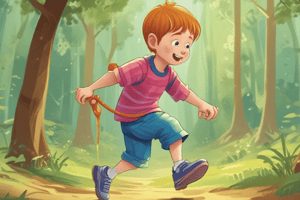Podcast
Questions and Answers
At what age do children typically start to walk independently?
At what age do children typically start to walk independently?
- 18-24 Months
- 12-18 Months (correct)
- 6-12 Months
- 2-3 Years
Which of the following fine motor skills is expected at 2-3 years of age?
Which of the following fine motor skills is expected at 2-3 years of age?
- Scribbling
- Turning pages of a book
- Building towers
- Cutting with scissors (correct)
What cognitive skill do children start to develop between 18-24 months?
What cognitive skill do children start to develop between 18-24 months?
- Matching colors and shapes (correct)
- Understanding time concepts
- Engaging in imaginative play
- Following two-step commands
Which milestone is typically observed in a child aged 3-5 years?
Which milestone is typically observed in a child aged 3-5 years?
Which gross motor skill is expected of children at the age of 2-3 years?
Which gross motor skill is expected of children at the age of 2-3 years?
At what stage do children typically begin to show empathy?
At what stage do children typically begin to show empathy?
Which speech and language milestone is expected at 0-6 months?
Which speech and language milestone is expected at 0-6 months?
At what age do children typically start engaging in parallel play?
At what age do children typically start engaging in parallel play?
At what age does the infant begin to display the Ulnar Palmar Grasp?
At what age does the infant begin to display the Ulnar Palmar Grasp?
Which grasp is characterized by the thumb and index finger picking up small objects?
Which grasp is characterized by the thumb and index finger picking up small objects?
Which grasp involves the use of the thumb, index, and middle fingers to hold larger objects?
Which grasp involves the use of the thumb, index, and middle fingers to hold larger objects?
What developmental milestone typically occurs at 10-12 months of age?
What developmental milestone typically occurs at 10-12 months of age?
The Radial Palmar Grasp is predominantly used during which age range?
The Radial Palmar Grasp is predominantly used during which age range?
At what developmental stage do children begin to hold writing tools with fingers pointed downward?
At what developmental stage do children begin to hold writing tools with fingers pointed downward?
What grasp involves a three-finger configuration with stable wrist movement?
What grasp involves a three-finger configuration with stable wrist movement?
Which mature grasp pattern is defined by finger movements rather than wrist movement?
Which mature grasp pattern is defined by finger movements rather than wrist movement?
Flashcards
Gross motor skills at 0-6 months?
Gross motor skills at 0-6 months?
Rolling over, head control, pushing up on arms.
Gross motor skills at 6-12 months?
Gross motor skills at 6-12 months?
Sitting, crawling, pulling to stand.
Gross motor skills at 12-18 months?
Gross motor skills at 12-18 months?
Walking, squatting, climbing stairs with help.
Gross motor skills at 18-24 months?
Gross motor skills at 18-24 months?
Signup and view all the flashcards
Fine motor skills at 0-6 months?
Fine motor skills at 0-6 months?
Signup and view all the flashcards
Fine motor skills at 6-12 months?
Fine motor skills at 6-12 months?
Signup and view all the flashcards
Fine motor skills at 12-18 months?
Fine motor skills at 12-18 months?
Signup and view all the flashcards
Cognitive milestones at 0-6 months?
Cognitive milestones at 0-6 months?
Signup and view all the flashcards
Cognitive milestones at 6-12 months?
Cognitive milestones at 6-12 months?
Signup and view all the flashcards
Cognitive milestones at 12-18 months?
Cognitive milestones at 12-18 months?
Signup and view all the flashcards
Social-emotional skills at 0-6 months?
Social-emotional skills at 0-6 months?
Signup and view all the flashcards
Social-emotional skills at 6-12 months?
Social-emotional skills at 6-12 months?
Signup and view all the flashcards
Social-emotional skills at 12-18 months?
Social-emotional skills at 12-18 months?
Signup and view all the flashcards
Speech and language at 0-6 months?
Speech and language at 0-6 months?
Signup and view all the flashcards
Speech and language milestones at 6-12 months?
Speech and language milestones at 6-12 months?
Signup and view all the flashcards
Speech and language at 12-18 months?
Speech and language at 12-18 months?
Signup and view all the flashcards
Study Notes
Gross Motor Milestones
- 0-6 Months: Infants develop head control, roll over, and begin pushing up on their arms.
- 6-12 Months: Sitting independently, crawling, and pulling themselves to stand.
- 12-18 Months: Walking independently, squatting to pick up toys, and climbing stairs with assistance.
- 18-24 Months: Running, kicking a ball, and starting to jump.
- 2-3 Years: Climbing stairs independently, running with coordination, and jumping with both feet.
- 3-5 Years: Hopping on one foot, catching a ball, and beginning to skip.
Fine Motor and Manipulation Milestones
- 0-6 Months: Reaching for and grasping objects, transferring items between hands.
- 6-12 Months: Developing the pincer grasp (thumb and index finger), pointing, and intentionally releasing objects.
- 12-18 Months: Scribbling, stacking blocks, and using a spoon with assistance.
- 18-24 Months: Building towers, turning pages, and using a fork.
- 2-3 Years: Copying a circle, cutting with scissors, and stringing beads.
- 3-5 Years: Drawing shapes, dressing independently, and using utensils.
Cognitive Milestones
- 0-6 Months: Tracking objects with their eyes, recognizing familiar people, and responding to voices.
- 6-12 Months: Imitating sounds, exploring objects, and beginning to understand object permanence (understanding that objects still exist even when they are out of sight).
- 12-18 Months: Following one-step commands, pointing to objects, and engaging in simple pretend play.
- 18-24 Months: Matching colors and shapes, increased pretend play, and recognizing familiar routines.
- 2-3 Years: Engaging in imaginative play, beginning to solve simple puzzles, and following two-step commands.
- 3-5 Years: Understanding time concepts, sorting objects by size, and counting.
Social-Emotional Milestones
- 0-6 Months: Smiling, recognizing primary caregivers, and starting to develop trust.
- 6-12 Months: Developing stranger anxiety, showing a preference for caregivers, and engaging in social games like peek-a-boo.
- 12-18 Months: Showing affection, beginning to play next to others, and recognizing themselves in the mirror.
- 18-24 Months: Engaging in parallel play (playing alongside others without interacting directly), seeking attention from caregivers, and beginning to show empathy.
- 2-3 Years: Beginning to share, identifying with others, and managing basic emotions.
- 3-5 Years: Engaging in cooperative play, developing friendships, and beginning to understand others' perspectives.
Speech and Language Milestones
- 0-6 Months: Cooing, smiling responsively, and turning towards sounds.
- 6-12 Months: Babbling, responding to their name, and using simple gestures like waving.
- 12-18 Months: Saying first words, following simple commands, and pointing to body parts.
- 18-24 Months: Combining two words, identifying familiar people, and answering simple questions.
- 2-3 Years: Speaking in short sentences (2-3 words), following two-step commands, and naming familiar objects.
- 3-5 Years: Speaking in longer sentences, understanding basic grammar, and asking questions.
Grasp Patterns by Age
- 0-2 Months: Reflexive grasp - an automatic response where a baby's fingers close around an object in their hand. This reflex fades around 2 months.
- 2-4 Months: Ulnar palmar grasp - holding objects on the ulnar (pinky) side of the hand with little thumb involvement.
- 4-5 Months: Palmar grasp - using the whole hand to wrap around an object without thumb participation.
- 6-7 Months: Radial palmar grasp - holding objects on the thumb side of the palm, with the thumb now joining to help grasp.
- 7-8 Months: Raking grasp - using fingers to sweep and rake small objects, like crumbs or small toys.
- 8-10 Months: Radial digital grasp - grasping objects between the thumb and fingertips.
- 9-10 Months: Inferior pincer grasp - using the thumb and the side of the index finger to grasp small items.
- 10-12 Months: Neat pincer grasp - refined use of the thumb and the tip of the index finger to pick up tiny objects.
- 10-12 Months: Three-jaw chuck grasp - using the thumb, index, and middle fingers to grasp larger objects.
- 12 Months: Superior pincer grasp - precise movement using the tips of the thumb and index finger.
- 12-18 Months: Palmar supinate grasp - holding tools in the palm with the arm moving as a whole.
- 18-24 Months: Digital pronate grasp - holding writing tools with fingers extended and pointed downward, allowing more controlled forearm movement.
- 2-3 Years: Static tripod grasp - a three-finger grasp with the thumb, index, and middle fingers with a stable wrist; movement comes from the shoulder.
- 3 Years: Quadrupod grasp - like the tripod but using four fingers (thumb, index, middle, and ring) for extra stability.
- 4-5 Years: Dynamic tripod grasp - mature grasp where the writing tool is held between thumb, index, and middle fingers using finger movements for precision.
Studying That Suits You
Use AI to generate personalized quizzes and flashcards to suit your learning preferences.




